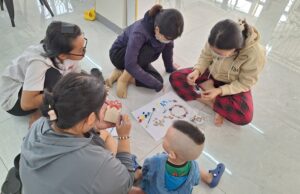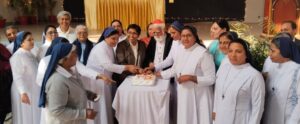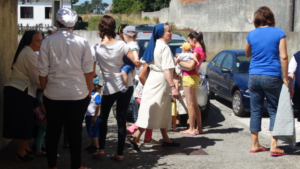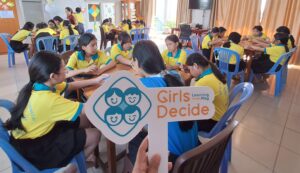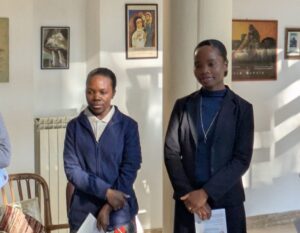Par l'équipe de communication, Kenya (Province d'Afrique centrale orientale)
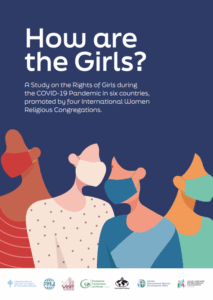 La simple pero contundente pregunta "Cómo están las niñas?" dio origen a una iniciativa de investigación global realizada en seis países que reveló el devastador impacto de la COVID-19 en niñas y mujeres jóvenes. Liderado por cuatro Congregaciones Religiosas Internacionales de mujeres, incluida Nuestra Señora de la Caridad del Buen Pastor, el estudio documentó cómo la pandemia incrementó los riesgos de violencia, matrimonio precoz y embarazo adolescente, a la vez que redujo el acceso a la educación, los recursos digitales y el apoyo a la salud mental.
La simple pero contundente pregunta "Cómo están las niñas?" dio origen a una iniciativa de investigación global realizada en seis países que reveló el devastador impacto de la COVID-19 en niñas y mujeres jóvenes. Liderado por cuatro Congregaciones Religiosas Internacionales de mujeres, incluida Nuestra Señora de la Caridad del Buen Pastor, el estudio documentó cómo la pandemia incrementó los riesgos de violencia, matrimonio precoz y embarazo adolescente, a la vez que redujo el acceso a la educación, los recursos digitales y el apoyo a la salud mental.
En Kenia, donde muchas niñas quedaron rezagadas durante el cierre de escuelas y las familias atravesaban dificultades económicas, estos hallazgos inspiraron acciones concretas. Nuestras Hermanas y Laicas en la misión transformaron la investigación en programas en tres regiones de este país de África Oriental, cada uno adaptado a las necesidades locales, pero unidos en la misión de impulsar y empoderar a las niñas.
Sueños digitales hechos realidad en Kitale
En Kitale, donde nos centramos en reducir la brecha digital, lanzamos cursos de alfabetización digital para niñas excluidas del aprendizaje en línea durante la pandemia. Cuarenta y cuatro niñas del barrio de Matisi han adquirido habilidades digitales vitales, lo que ha fortalecido su confianza y les ha abierto las puertas a oportunidades de educación, empleo y liderazgo. Algunas se han convertido en mentoras, extendiendo el impacto a sus comunidades. Para que el empoderamiento sea sostenible, el programa también brinda apoyo nutricional a más de 5000 adolescentes en ocho escuelas, vinculando la nutrición y la dignidad con el éxito académico. El programa va más allá de la alfabetización digital. Gracias a una generosa donación del Ministerio de Agricultura y Pesca, hemos creado estanques de peces que proporcionarán conocimientos a las familias y generarán fuentes de ingresos sostenibles, fortaleciendo así a comunidades enteras.
Construyendo bases sólidas en Ngong
Ngong alberga el Centro de Mujeres Eufrasia, que se centra en la educación y la defensa de los derechos. Fundado en 1992, ahora apoya a mujeres tanto en asentamientos urbanos como en aldeas rurales. A través de 28 Grupos de Autoayuda registrados, casi 300 mujeres acceden a microfinanzas, capacitación en emprendimiento y concientización sobre sus Derechos. Esto les ha permitido lograr la independencia económica, a la vez que se apoyan mutuamente en la acción colectiva. Para los niños, un programa de mentoría proporciona habilidades para la vida y apoyo psicosocial, abordando directamente el abandono y la delincuencia en comunidades vulnerables. El centro también ofrece formación profesional, dotando a los jóvenes de habilidades en áreas como: Peluquería y cuidado del cabello. Sesenta estudiantes se graduaron en 2024, y muchos de ellos se incorporaron directamente al mercado laboral, un paso vital para abordar el desempleo juvenil.
Sanando corazones y mentes en Embu
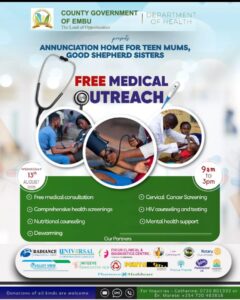 En Embu, nuestras Hermanas y Colaboradores en misión están abordando los problemas de salud mental y las vulnerabilidades de las madres jóvenes. Iniciado en 2024, el proyecto Imarisha Dada apoya a niñas embarazadas y madres adolescentes mediante asesoramiento, capacitación en habilidades para la vida, atención médica y reconciliación familiar. Los grupos de pares fomentan el apoyo mutuo, mientras que el Hogar de la Anunciación ofrece refugio temporal y vías de reincorporación a la educación o al trabajo. El programa también involucra a las comunidades, transmitiendo debates sobre violencia de género y bienestar a través de Radio Kimuri, llegando a miles de oyentes. Además, una visita a un campamento médico realizada en agosto ha ampliado aún más el acceso a la atención médica y ha generado conciencia sobre los derechos de salud reproductiva, atendiendo las necesidades inmediatas y fortaleciendo la capacidad comunitaria a largo plazo.
En Embu, nuestras Hermanas y Colaboradores en misión están abordando los problemas de salud mental y las vulnerabilidades de las madres jóvenes. Iniciado en 2024, el proyecto Imarisha Dada apoya a niñas embarazadas y madres adolescentes mediante asesoramiento, capacitación en habilidades para la vida, atención médica y reconciliación familiar. Los grupos de pares fomentan el apoyo mutuo, mientras que el Hogar de la Anunciación ofrece refugio temporal y vías de reincorporación a la educación o al trabajo. El programa también involucra a las comunidades, transmitiendo debates sobre violencia de género y bienestar a través de Radio Kimuri, llegando a miles de oyentes. Además, una visita a un campamento médico realizada en agosto ha ampliado aún más el acceso a la atención médica y ha generado conciencia sobre los derechos de salud reproductiva, atendiendo las necesidades inmediatas y fortaleciendo la capacidad comunitaria a largo plazo.
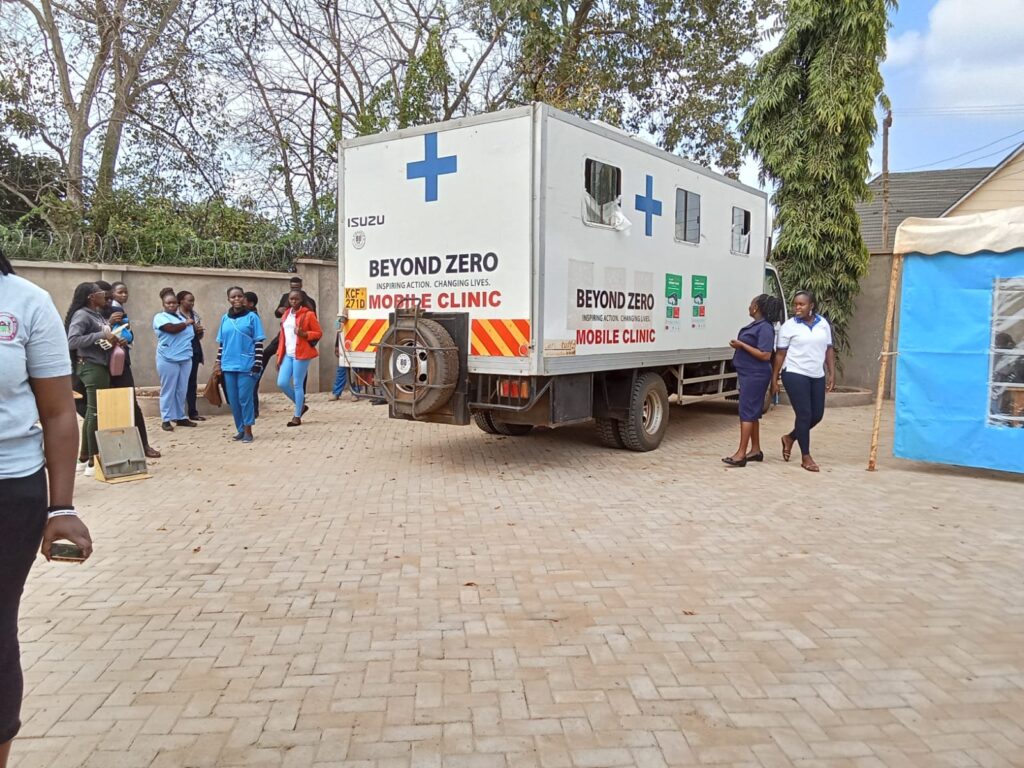
Transformación en Acción
Estos programas demuestran que cuando la investigación fundamenta la acción y la compasión impulsa la implementación, se producen cambios notables. Niñas que antes enfrentaban obstáculos insalvables ahora lideran negocios exitosos. Madres adolescentes reconectan con sus familias y regresan a la escuela. Comunidades que antes guardaban silencio sobre la salud mental ahora participan en conversaciones abiertas y solidarias. El éxito de estos programas se debe a sólidas alianzas con agencias gubernamentales, organizaciones locales y socios internacionales.
Un Plan para la Esperanza
La iniciativa "Cómo están las niñas?" demuestra que las organizaciones religiosas pueden responder eficazmente a desafíos sociales complejos. Al combinar investigación rigurosa con acción compasiva, colaboración comunitaria con apoyo individual e intervención inmediata con desarrollo a largo plazo, estos programas están sentando las bases para un cambio duradero.
A medida que estas iniciativas continúan expandiéndose, se erigen como ejemplos contundentes de transformación en acción. La pregunta "¿Cómo están las niñas?" se está respondiendo con esperanza, empoderamiento y cambio sostenible en toda Kenia.
Participe: Learn more about these life-changing programs by visiting www.rgs-ecap.org or following the Province of Eastern Central Africa’s social media platforms (Facebook, Instagram, y YouTube).
Descargue el informe completo de investigación "¿Cómo están las niñas?'' rapport de recherche aquí:

